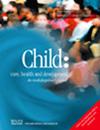Youth Depression After an Environmental Disaster: Is There a Relationship to Caregiver Stress and Depression?
Abstract
Background
In the United States, female youth have been experiencing high levels of mental health challenges, including depression. Many factors increase the risk of developing mental health issues, including exposure to traumatic events, like the Flint water crisis. To better understand this connection, this study aims to answer the question: How do depression symptoms in this Flint Registry sample of girls compare with national norms and how are child depression symptoms related to parental/caregiver depression symptoms and perceived stress?
Methods
The cohort included 539 girls, ages 6–17, and their parents who were Flint residents and had completed a baseline survey for their child and themselves during 2019–2021 and a follow-up survey (2020–2022). The Behavior Assessment System for Children (BASC-3) measured child depression symptoms; the Quality of Life in Neurological Disorders (Neuro-QoL) depression subscale and Perceived Stress Scale Short Form (PSS-4) measured adult depressive symptoms and perceived stress. Statistical analysis included One-Sample Chi-Square and Bayesian correlation and regression analysis.
Results
At enrolment, the prevalence of at-risk or clinically significant depression symptoms in Flint girls was higher than in the general population (23.6% vs. 15.9%, p < 0.01). At follow-up, the prevalence decreased, yet there was still a significant difference between Flint girls (19.3%) and the general population (p < 0.05). Child measures of depressive symptoms at follow-up were significantly correlated with caregiver measures of depression and stress at both time points. Child depression symptoms at baseline and caregiver depression and stress were predictive of child depressive symptoms at follow-up.
Conclusions
Results reveal high rates of depressive symptoms after a manmade environmental disaster, as well as a relationship between female youth mental wellness and caregiver well-being. Being able to understand and identify depression symptoms in both children and caregivers is an important aspect of public health services and reinforces the call for expanding mental health screening and treatment.

 求助内容:
求助内容: 应助结果提醒方式:
应助结果提醒方式:


